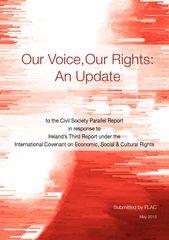
By Ann Marie Foley - 10 June, 2015
Pro life and social justice organisations were are at the UN this week to highlight injustices such as child poverty in Ireland and to speak up for the unborn.
The Third Periodic Review of Ireland by the United Nations Committee on Economic, Social and Cultural Rights took place at the UN on Monday and Tuesday.
Irish NGOs expressed concerns about how the State has protected basic rights such as housing, health, education, work, social security, family life, adequate standard of living and cultural life.
Sean Sherlock, Minister of State for Development, Trade Promotion and North South Cooperation of Ireland, told the committee that the Government had had to make tough choices in the face of an unprecedentedly precarious financial situation and had reformed expenditure in a way that continued to protect the most vulnerable people to the greatest extent possible within available resources.
The Committee will release its formal, written concluding observations and towards the end of its three-week session, concluding on 19 June 2015.
In its initial summary the Committee stated, “Speakers from Ireland raised concerns about the negative impact of the measures on human rights and equality, and the choices of its Government which prioritised fiscal consolidation and focused on the protection of the banking sector, disregarding the human rights implications of such choices.”
“The most severely impacted by cuts to public expenditure since 2008 were families: rights had been overruled by economic expediency and there was restricted access for one-parent families to social protection, affecting one in four families living in Ireland; more than half of those families lived in deprivation,” the committee stated.
Among those who spoke were the Irish Human Rights and Equality Commission, and NGOs including Free Legal Advice Centres, Community Law and Mediation, Justice for Magdalens Research, Threshold – The National Housing Charity, Tallaght Trialogue, Atheist Ireland, Irish Family Planning Association, the Pro Life Campaign, Family and Life, and University College Dublin.
The UN committee also summarised other issues raised stating, “Abortion remained criminalised and the threat of 14 years imprisonment hung over women who had abortions because their health was at risk, because of a foetal anomaly, where pregnancy was a result of a crime, or in any other circumstances.”
Barrister Lorcan Price on behalf of the Pro Life Campaign (PLC) told the committee, “The International Covenent on Civil and Political Rights protects human beings during the pre-natal period of life. Under Article 6 it recognises them as holders of human rights and subjects of international law.”
“It is regrettable that the United Nations Human Rights Committee has consistently criticised Ireland for not expanding the availability of abortion. The Irish legal position, that the unborn child has human rights, should be afforded the highest deference from international Human Rights bodies.”

Free Legal Aid Centres (FLAC) presented details from its Our Voice Our Rights report and update, which had input from more than 80 organisations.
On behalf to them, Noeline Blackwell stated that the recession brought about deep suffering and pain for many people living in Ireland.
“They were denied access to their fundamental rights through reduced access to basic services, less accessible remedies and increased poverty.
The reports show that the poorest 10% of the population suffered the most as a result of the measures taken during the recession,” she said.
“The focus of the government and its external funders – the EU and IMF – was on protecting the banking system and state finances.”
She also pointed out that women, young people and people with disabilities are disadvantaged in the workplace, or less likely to be employed.
Over 20% of workers are in low paid employment and the recently agreed low pay commission has an unnecessarily narrow focus.
The Our Voice Our Rights report highlighted:
.15.2% of the Irish population was at risk of poverty and 7.7% lived in consistent poverty in 2013.
.children, unemployed lone parents and people with illness/disability, Travellers/Roma had the highest rates of consistent poverty.
.13.2% of the population experienced food poverty in 2013.
. health services expenditure fell by 16% between 2009 and 2014.
. initial cuts gave greater efficiencies, but continued austerity increased waiting lists and patient’s costs and cut public beds.
The report states that Government cuts damaged access and affordability to quality education including the reduction in teachers, rationalisation of support services, abolition of school grants, increase in transport charges, reduction of clothing and footwear allowance.
Children with special needs face particular obstacles and those who need English language support as this was cut in 2012 by 19%.
Third level education costs increased while grants were cut so education is becoming the preserve of middle and professional classes.
Those living in rural Ireland continue to be denied access to public services, education and the other advantages of the internet through a lack of access to broadband.